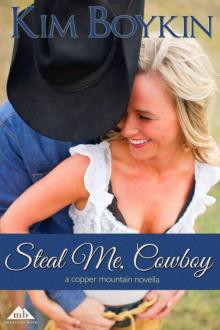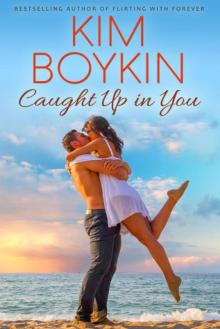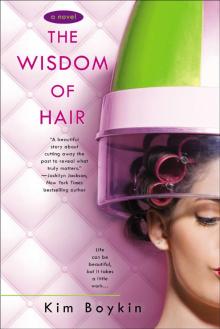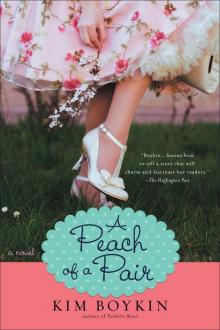- Home
- Kim Boykin
The Wisdom of Hair
The Wisdom of Hair Read online
“In Kim Boykin’s novel, hair is not only wise, it’s witty and eloquent. As we’ve long suspected, our hair can define us. It can also teach us things about ourselves that will surprise and change us. The Wisdom of Hair is a lovely, engaging novel. Zora Adams is a heroine to root for!”
—Wendy Wax, author of Ocean Beach
“The Wisdom of Hair has a big, beating heart, and I couldn’t put it down. What I loved best about the book was the pervasive kindness; page after page, good people try their best, sometimes succeeding and sometimes failing. It’s hard to write an engaging novel about (mostly) nice people, but Kim Boykin has pulled it off.”
—Ann Napolitano, author of A Good Hard Look
Welcome to Beauty School
According to the brochure, beauty school was supposed to be “The Beginning of an Exciting Career That Will Last a Lifetime.” But the first thing that caught my eye when I walked through the front door of the Davenport School of Beauty was a sign on slick white poster board beside the cash register. A bubble over a pair of legs said, NO MORE THAN THREE ABOVE THE KNEE. Looking down at my uniform, I didn’t need a ruler to tell me that I was out of line.
I pulled at the sides of my uniform, trying to lengthen the hem like a lot of the other students. I could just picture us all after school let out, sitting around our respective homes with scissors, big red tomato pincushions, and spools of white thread scattered about, undoing our hemlines.
Nobody looked anything like the proud, confident blonde on the cover of the brochure, except for one girl. She was the only one not worrying her dress. Hers was an inch or two below the knee and had a sassy little slit up the back. From the neck up, she looked like a movie star, and the way she carried herself made you forget that she could probably afford to lose fifty or sixty pounds.
As attendance was called, we were supposed to introduce ourselves. Some of the girls stammered or giggled. My own voice came out just above a whisper, but the big girl spoke in a deep, sexy drawl with a proud confidence that every single girl in the room coveted. We looked at Sara Jane Farquhar in awe, and there wasn’t a single soul in that room, even our instructor, who didn’t want to be her…
THE
WISDOM
OF HAIR
Kim Boykin
BERKLEY BOOKS, NEW YORK
THE BERKLEY PUBLISHING GROUP
Published by the Penguin Group
Penguin Group (USA) Inc.
375 Hudson Street, New York, New York 10014, USA
USA / Canada / UK / Ireland / Australia / New Zealand / India / South Africa / China
Penguin Books Ltd., Registered Offices: 80 Strand, London WC2R 0RL, England
For more information about the Penguin Group visit penguin.com
This book is an original publication of The Berkley Publishing Group.
Copyright © 2013 by Kim Boykin.
“Readers Guide” copyright © 2013 by Penguin Group (USA) Inc.
All rights reserved. No part of this book may be reproduced, scanned, or distributed in any printed or electronic form without permission. Please do not participate in or encourage piracy of copyrighted materials in violation of the author’s rights. Purchase only authorized editions.
BERKLEY® is a registered trademark of Penguin Group (USA) Inc.
The “B” design is a trademark of Penguin Group (USA) Inc.
Library of Congress Cataloging-in-Publication Data
Boykin, Kim, 1957–
The wisdom of hair / Kim Boykin.—Berkley trade paperback ed.
p. cm.
1. Beauty shops—Fiction. 2. Female friendship—Fiction. 3. Hair—Fiction.
4. South Carolina—Fiction. I. Title.
PS3602.O95W57 2013
813’.6—dc23 2012035919
ISBN: 978-1-101-61957-5
PUBLISHING HISTORY
Berkley trade paperback edition / March 2013
Cover photograph of woman © Glow Images, Inc. / Getty Images;
photograph of leather upholstery © iStockphoto / Thinkstock.
Cover design by Judith Lagerman.
Interior text design by Laura K. Corless.
This is a work of fiction. Names, characters, places, and incidents either are the product of the author’s imagination or are used fictitiously, and any resemblance to actual persons, living or dead, business establishments, events, or locales is entirely coincidental. The publisher does not have any control over and does not assume any responsibility for author or third-party websites or their content.
ALWAYS LEARNING PEARSON
For my grandfather, Bryan Standridge,
the greatest storyteller I have ever known,
and to my parents for their never-ending love story
ACKNOWLEDGMENTS
Attempting to publish is a lot like golf; it’s an awful endeavor and just when you’re ready to give up, one small good thing will happen that gives you hope and makes you believe. I had a lot of years like that until my agent, Kevan Lyon, picked me. Thank you, Kevan, for being an extraordinary agent and friend. Heartfelt thanks to Berkley Publishing and to my amazing editor, Leis Pederson, a Southern girl like me. Thanks, Leis, for loving this story to publication and nailing the title.
Thank you to Miranda Fuller, my first reader, who made me believe this was possible. To my critique partners, Wendy Oglesby, Mary Ann Thomas, Vera LaFleur, Claire Iannini, Susan Martin, Kim Blum-Hyclak, and Jes Young, all wonderful writers, thank you for your good judgment and honesty.
For Crickett Pfirman and hair stylists everywhere who really have answered one of life’s highest callings, thank you for making those of us in your charge feel valuable and beautiful.
Finally, love and thanks to my family. To Kaley and Austin, thank you for sharing your childhood with me, I’m so proud of who you are. And to Mike, my husband of thirty years and counting, you are my heart. Thank you for believing in me.
Table of Contents
Cover
Praise for Kim Boykin
Title Page
Copyright
Dedication
Acknowledgments
Chapter 1
Chapter 2
Chapter 3
Chapter 4
Chapter 5
Chapter 6
Chapter 7
Chapter 8
Chapter 9
Chapter 10
Chapter 11
Chapter 12
Chapter 13
Chapter 14
Chapter 15
Chapter 16
Chapter 17
Chapter 18
Chapter 19
Chapter 20
Chapter 21
Chapter 22
Chapter 23
Chapter 24
Chapter 25
Chapter 26
Chapter 27
Chapter 28
Chapter 29
Chapter 30
Chapter 31
Chapter 32
Chapter 33
Chapter 34
Chapter 35
Chapter 36
Chapter 37
Chapter 38
Readers Guide to: The Wisdom of Hair
1
The problem with cutting your own hair is that once you start, you just keep cutting, trying to fix it, and the truth is, some things can never be fixed. The day of my daddy’s funeral, I cut my bangs until they were the length of those little paintbrushes that come with dime-store watercolor sets. I was nine years old. People asked me why I did it, but I was too young then to know I was changing my hair because I wanted to change my life.
Ten years later, I stared into my mother’s dressing-table mirror, ready to shave my head. It was my birthday, and Mama was going out to celebrate. She stood in f
ront of me for her ta-dah moment, decked out like Judy Garland, her pretty blond hair covered up with cheap chestnut color, and put up under a black fedora. The oversized men’s tuxedo jacket she wore had been taken in at all the right places and didn’t come close to mid-thigh. Unlike her alter ego, she’d skipped the dress shirt altogether. Regulation black pumps clicked across our bare floor like tap shoes, long legs moving in short steps to mimic Judy’s four-foot-ten-inch stride. Mama wasn’t going to a costume party. She always dressed like her favorite star, who died on a toilet seat the year Mama was born. Right down to the fake eyelashes.
“I’ll be home directly, and we’ll cut the cake,” she said.
I knew that was a lie because she was already slurring her words and there was no cake.
“Sure, Mama. Just be safe.”
She cocked her head to the side and looked around me to see herself again in the full-length mirror duct taped to the front of the bathroom door. Her long, slender fingers ran over the black satin lapels and then reached inside her jacket and pulled her breasts up as high as they would go. She arranged her wares until she’d achieved the maximum cleavage for a B cup, and sighed.
“You don’t have this problem.” She raised her eyebrows at me like I’d been playing dress-up with her breasts and she wanted them back. “How do I look?”
“Beautiful,” I said, because she was beautiful.
“I do look good.” She turned sideways, eyed her long legs and smoothed her hand over her round bottom. “You’d look good, too, if you fixed up now and then.”
Mama’s definition of my fixing up was making me play Liza Minnelli to her Judy Garland. Up until I was eleven, I let her cut my hair short once a year and spray it jet black with Halloween color she bought every November on clearance. I was so excited when she dressed me up like a child star and pulled the kitchen chairs in front of the TV so we could watch The Wizard of Oz together. I watched her mouth every line Dorothy Gale spoke with great expression. By the time Dorothy declared there was no place like home, Mama was almost two pints into the story and sobbing because she’d been robbed of her Oscar for A Star Is Born.
As crazy as that sounds, she wasn’t always like that, not when my daddy was living. But she was never the kind of mom who wore the macaroni necklaces you made her or showed up at your elementary school play sober. She got worse after Daddy passed, so bad my uncle Heath took her to the state mental hospital in Columbia to see what was wrong with her. Other than drying her out, there was nothing the doctors could do for her. They sent her back home with a diagnosis my uncle wrote down because he couldn’t remember the word narcissistic, much less pronounce it.
“Bet you’d like to go out with me. We could do your birthday up right.” She opened the closet, pulled out two hangers, and dangled them in front of me—black satin hot pants and a halter top with a cowl neckline that plunged close to navel level.
“I made this to wear on Oscar night the year Cabaret came out. Bet you anything it’ll fit you. What do you say?”
The last time I saw Mama in that outfit, she didn’t come home for two days and when she did, two things were obvious: She’d danced the feet out of her thick black fishnet stockings and someone had roughed her up. I was only eleven years old, but that was old enough to know, no matter what it cost me, I didn’t want to be a part of her charade anymore.
“Just be safe.”
*
It was just after three in the morning, and she wasn’t home. As much as I tried to make out like I didn’t care, I did. With every minute that passed, the worry inside me grew. I told myself to go to bed, but it’s just as easy to worry upright as it is laying flat in the bed. I pushed the door open to her bedroom. Costumes puddled on the floor, a mass of cheap satin and sequins she’d stitched together herself. The Tampa cigar box she used for a jewelry box was running over with cheap dime-store trinkets men had given her or she’d bought herself with money we didn’t have. The room smelled like Ambush, her favorite cologne, thick and musky and nauseatingly sweet.
I sat down at the dressing table eye to eye with myself, took the clippers out of the drawer, and plugged them in. They vibrated in my hand; the sensation traveled up my arm and settled in my brain.
It didn’t matter that I was smart enough to go to college. It didn’t matter that I’d been accepted to the best beauty school in the state three hundred miles from home. It didn’t make a stitch of difference that my high-school English teacher, Miss Cunningham, had found me a place to stay rent free there so I could become a cosmetologist in six months. By process of elimination, I was the only fool left on the mountain who would take care of Mama, and shaving my head wouldn’t change anything.
I turned off the clippers about the same time she stumbled through the front door with a present, the first one she’d given me in years—and his name was Bob.
“It’s her birthday,” Mama gushed, her red lipstick smeared all over her face, while Bob groped her. “Happy birthday,” she said completely out of character, more like Marilyn Monroe.
“You gonna tell her?” Bob propped himself up against the wall with a proud smile. Mama shook her head, elbowed him, and giggled again. He motioned for me to come closer and didn’t seem to notice I’d traded my clippers for the baseball bat I kept just inside my bedroom door.
“Go to bed, Mama.”
Bob leaned forward, almost toppling over, before he righted himself enough to get the words out. “How about a three-way for your birthday?”
I slammed my bedroom door and wedged the ladder-back chair under the doorknob, because mountain houses don’t have locks, and if they do they don’t work since nobody ever uses them. My hands were shaking so, I could barely dial the telephone number.
“Miss Cunningham?”
“Zora?”
“I’m sorry to wake you.”
“What’s wrong?”
Miss Cunningham had offered a thousand times to rescue me from the little bit she knew about my life.
“I can’t stay here anymore.”
There was a long silence, so long I was afraid she’d gone back to sleep.
“Do you want me to come get you now?”
I had a tiny flash of what normal might be like. Miss Cunningham would be on my doorstep in a matter of minutes, and we’d salvage my birthday. We’d bake cupcakes in the middle of the night, the kind she used to bring to my senior English class. The feral sounds coming from Mama’s bedroom were interrupted by the crack of a hard slap against bare flesh. Mama screamed. I cradled the phone on my shoulder and grabbed the bat. Before I could move the chair away from my bedroom door, her scream dissolved into laughter.
I tightened my grip on the bat. Why couldn’t I just say yes? “Tomorrow.”
“Are you sure?”
I knew what she meant. Could I leave the mountain? My homeplace? Could I really leave Mama?
“Tomorrow,” I said over the animal noises in the next room. “First thing tomorrow.”
“I’m proud of you, Zora.”
I wasn’t a crier, there was never much point to it, but my nose stung like someone had swatted it. Even after all those years of waiting for Mama to grow up, there was still enough child left in me that ached for a mother who said things like that, or, at the very least, wanted to protect me from the Bobs of the world. I started to hang up the phone when I heard her voice.
“Zora?”
“Yes, ma’am?”
“Happy birthday.”
2
Bob was gone when I got up the next morning. I’d debated on whether to leave Mama a note or just leave, but she was up early, and I didn’t have a choice. When I said I was leaving, I said just that. She tried to guilt me into staying, but she was too hungover to muster any look that might change my mind. Still, the part of me that was ready to bolt toward freedom wrestled with the sticky part of me that was terrified for her. I could feel her wanting a drink as she took attendance in her mind. My real daddy—dead. Daddy Heyward and Daddy Leo
n and Nana—dead. And me, her only child, leaving her alone. Something she feared more than death.
Miss Cunningham pulled up to our little house on the side of the mountain in a Toyota Land Cruiser; you didn’t see too many of those kinds of trucks back in 1983. She wore a pink Izod polo and a short khaki skirt that showed off her country-club tan. Mama eyed the gold chains with coin-looking charms dangling from Miss Cunningham’s neck.
“She don’t belong,” Mama said under her breath.
But she was one to talk standing there in an exact replica of the gold brocade outfit Judy Garland wore on the Ed Sullivan Show in 1965. Miss Cunningham pushed her sunglasses back so they rested on top of her head and gave me a hug. When I introduced her to Mama, she reached out to shake hands, but Mama wasn’t having any of that.
“You must be very proud of Zorie.” Miss Cunningham was from up north, and if she liked you, no matter what your name was, she’d put an “ie” on the end of it. Mama nodded without a smile and then looked at me like she wanted to know who in the hell Zorie was.
There wasn’t much to load into the jeep, just an old American Tourister suitcase and two boxes Mama would throw away for spite if I left them behind. By the time I closed the back of the truck, Mama was looking at Miss Cunningham like she could cut her heart out and eat it cold for supper.
“Bye, Mama.” It was a wonder those words came out of my mouth.
The pleading in her eyes made me look away, my mind screamed, Today Mama will take care of herself—so I can have a little piece of life for myself, punching every word so hard my body quaked. But Mama was trembling so over the fear of being alone, she didn’t seem to notice.
For the first time since Nana died, she took me in her arms. Her nails dug into the tender part of my arms. The sorrow I felt for her bonded with the pain shooting up toward my shoulders, her nails drawing blood. I ached, so I buried my face in her long, dark hair, breathed in the smell of honky-tonk smoke and baby shampoo, and waited for her to turn me loose.

 Just In Time for Christmas
Just In Time for Christmas Flirting with Forever (Island Bliss)
Flirting with Forever (Island Bliss) Steal Me, Cowboy (Copper Mountain Rodeo)
Steal Me, Cowboy (Copper Mountain Rodeo) Caught Up in You
Caught Up in You The Wisdom of Hair
The Wisdom of Hair Zen for Christians: a beginner's guide
Zen for Christians: a beginner's guide A Peach of a Pair
A Peach of a Pair